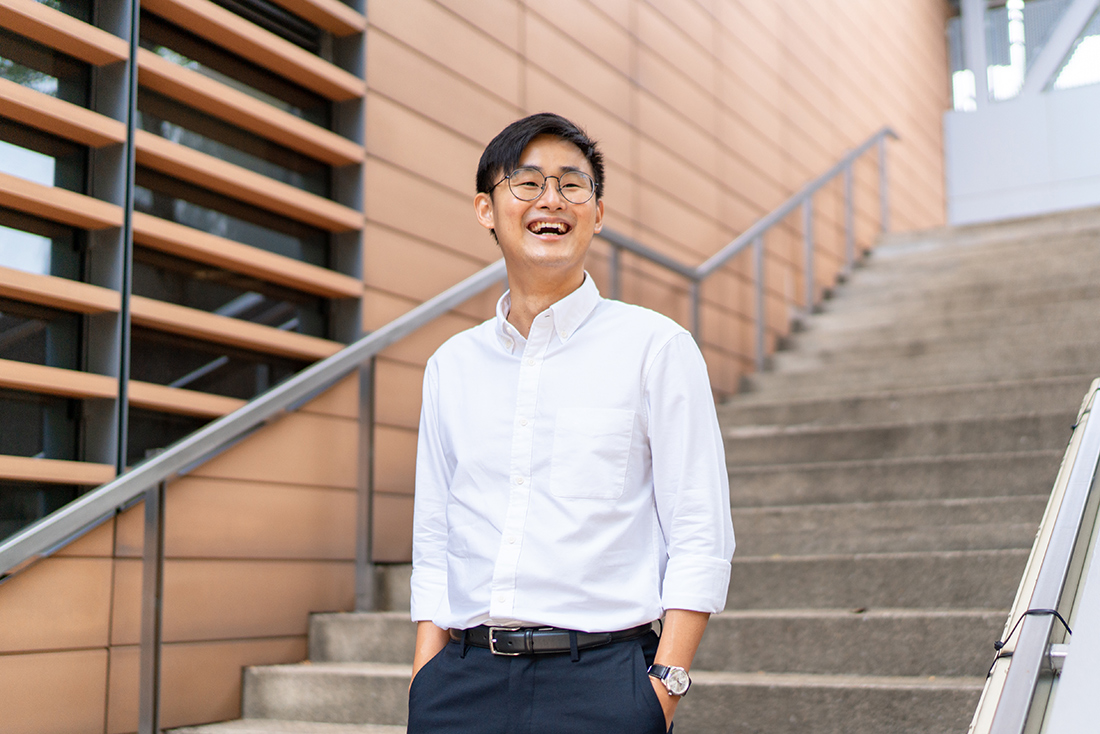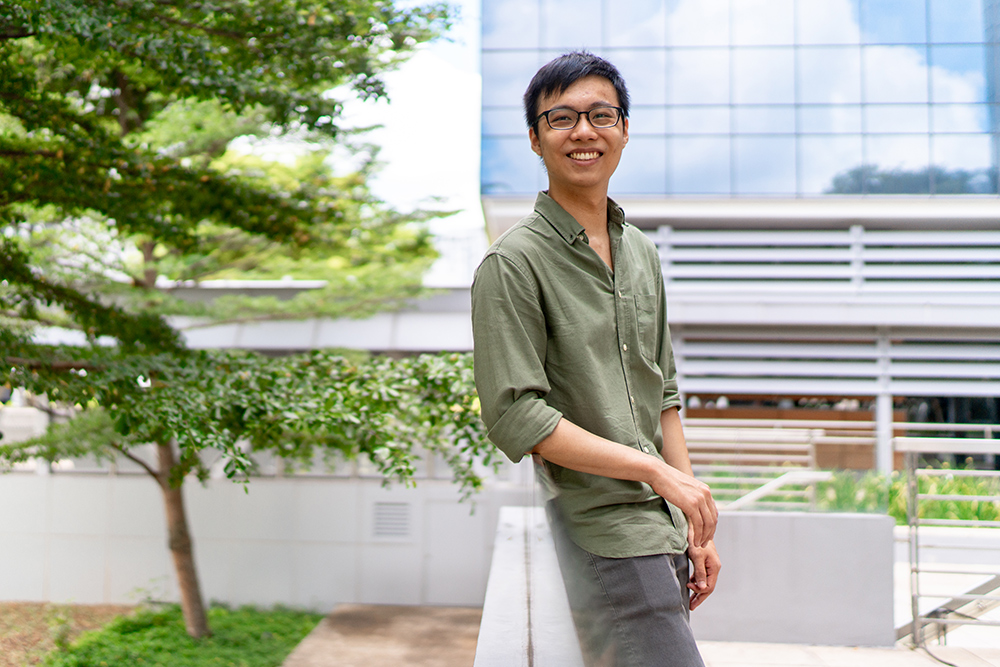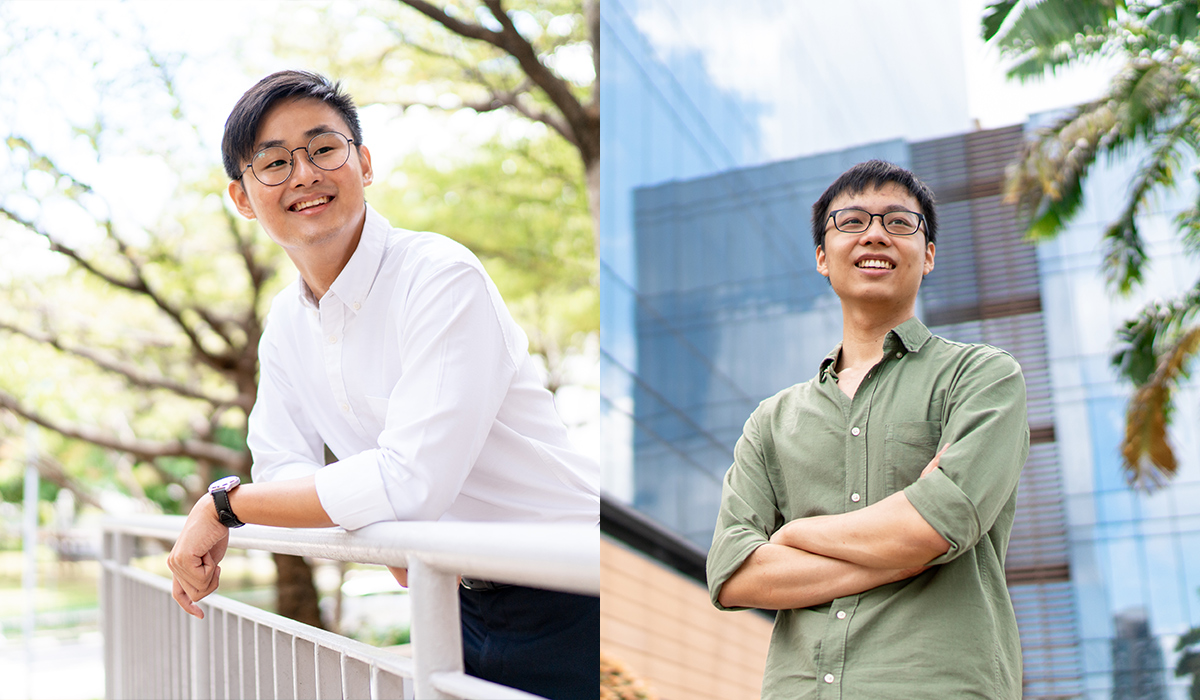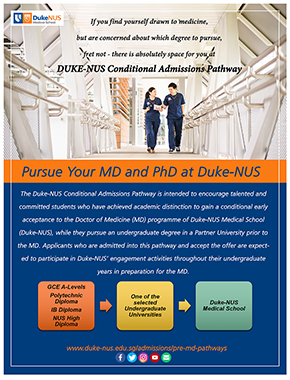Left: Gan Yu is a junior in the Singapore University of Technology and Design (SUTD), under the SUTD-Duke-NUS Special Track. He will graduate with a Bachelor of Engineering (BEng) degree at SUTD, followed by a Doctor of Medicine (MD) degree at Duke-NUS Medical School.
Right: Loh De Rong is in his final year pursuing Information Systems Technology and Design at SUTD. He has an NUS High School Diploma (High Distinction) with majors in Physics and Mathematics, and Honours in Biology and Chemistry.
The COVID-19 pandemic has shown us the importance of technological development alongside medicine, as digital medical solutions took centre stage in keeping us safe and healthy.
If you wish to embrace this convergence of technology and healthcare, there is a special path for you through the SUTD-Duke-NUS Special Track. It combines the technology and design-focused curriculum at Singapore University of Technology and Design (SUTD), with their undergraduate degree and a subsequent Doctor of Medicine degree at Duke-NUS Medical School. Through this track, future clinicians will have an edge in the industry as they work across disciplines, making them the benchmark of medical and technological science.
The 7½-year programme is rigorous, and students Gan Yu and Loh De Rong have eagerly embraced the challenge. Gan Yu is specialising in Engineering System and Design (ESD), focusing on data analytics and model building; De Rong is in his final year studying Information Systems Technology and Design.
They spoke to us about their student experience, their plans for the future, and most importantly, the SUTD-Duke-NUS difference.
To start off, why did each of you opt for the SUTD-Duke-NUS Special Track?
Gan Yu: I would say that it is because I see the most utility and cross-application of knowledge from both disciplines. Creating things through engineering concepts yield tangible results that can directly improve health processes, and I particularly enjoy being involved in work that has practical effects.
I chose SUTD because I was drawn to its mission to combine technology with design in teaching engineering. I believe that for learning to be enjoyable, we need opportunities to freely apply concepts learned from the classroom and add on a creative touch to make ideas our own.

Gan Yu
De Rong: I was very enticed by the idea of becoming a clinician. Looking at how rapidly technology is evolving; I can see how someone who is trained in engineering and medicine would be able to bridge the gap between these two disciplines as well as provide valuable insights which would be difficult for someone with knowledge from only one domain.
Gan Yu, you are currently pursuing Engineering System and Design (ESD) with a minor in Design, Technology and Society. How do you think your academic training complements the healthcare sector?
Gan Yu: In ESD, I have picked up skills in decision analytics, predictive modelling, and optimisation to meet operational needs. My academic journey so far has given me great utility in applying my engineering knowledge to meet the operational needs of hospitals, as well as to assess different policies that affect the efficiency of the system.
De Rong, we read that you're currently pursuing Information Systems Technology and Design (ISTD) at SUTD. How is the academic experience so far?
De Rong: It did not matter that I came to SUTD without any coding background or that I was struggling with certain concepts at times, because I was very fortunate to have met really good friends and professors who are always willing to guide me along. In fact, it was because of the positive experience I had for my first Python course with my professors that motivated my decision to further pursue computer science.
Both of you will be entering Duke-NUS Medical School. How have the people there helped your transition so far?
Gan Yu: My official clinical mentor from Changi General Hospital (CGH), who is also a clinical professor at Duke-NUS, has been an inspiring figure throughout my academic journey. Beyond believing in us, he has consistently reminded us about what it takes to be a good doctor, as well as the amount of effort we are to commit if we want to achieve our goals.
The admissions team from Duke-NUS has also been extremely helpful and supportive to the students. Apart from being responsive to many of our queries, they worked with us to secure shadowing opportunities, as well as arranged workshops to keep us in touch with experts in the medical field.

Loh De Rong
De Rong: There are so many people from Duke-NUS Medical School I am grateful for. The first person has to be my clinician mentor who has shared much valuable life and career advice with me. The other clinician mentors and the administrators of the programme have also been very helpful in actively guiding us and creating learning opportunities for us, including observerships, talks and even attachments at gazetted dormitory sites during the pandemic.
I personally feel that such exposure has been useful in helping me explore novel and interesting career options. Sometimes all we need is just someone to point us in the right direction, and just being in this programme provides exactly that critical access to a large treasured network of connections which I can readily tap on. This is the biggest plus point of the programme.
Why would you recommend the SUTD-Duke-NUS Special Track to other students?
Gan Yu: Duke-NUS has an extremely diverse community. Those from engineering may appreciate health technologies better, while those from the arts may have a lot more to share on ethics and health impacts on society.
Every Duke-NUS student has a strong commitment and passion for healthcare. Such an environment motivates one to put in their best, and consistently reminds us why we choose to take this path in the first place.
Badminton Boy
De Rong used to play badminton competitively. Hit him up for a game sometime!
De Rong: I think Duke-NUS's positive track record of producing ground-breaking research and many outstanding batches of graduate doctors year after year already speaks for itself. For anyone who is serious about pursuing medicine in a world-class institution, Duke-NUS Medical School definitely ranks as one of the top choices.
For those who might be interested in being a clinician scientist, the Duke-NUS curriculum has a dedicated year for research, which is not common in medical schools.
Finally, I like that the school is very accepting of applicants who come from various backgrounds, be it their nationality or academic qualifications. With such a small and diverse cohort, each of us is treated as a unique individual rather than a statistic.


